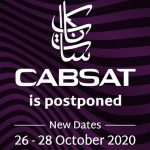CABSAT.Virtual provided an engagement opportunity for the full broadcast and satellite industry ecosystem, featuring qualified, influential buyers, networking with decision-makers and business pitches from across the world.
CABSAT.Virtual, the Middle East and North Africa’s first-ever virtual event for the broadcast, satellite and content communities, today concluded its virtual conference content and exhibition platform, successfully rounding off an initiative which has unified the entire content journey, from content creation to production and distribution.
Following the decision to move the physical edition of CABSAT to May 24-26, 2021, CABSAT.Virtual provided an engagement opportunity for the full broadcast and satellite industry ecosystem, featuring qualified, influential buyers, networking with decision-makers and business pitches from across the world.
Thomas Loffler, AVP, Exhibitions and Show Director, CABSAT, said: “CABSAT.Virtual has presented a unique opportunity for the broadcast, content and satellite industries to reconnect in these testing times, providing the chance to engage with world-class speakers, attendees and experts. Building on the success of CABSAT.Virtual, we are hugely excited to welcome you back to Dubai to the physical edition of CABSAT from May 24-26, 2021 at Dubai World Trade Centre.”
With broadcasters eager to offer a wider choice of programming and services, with better quality, interactivity and convenience, CABSAT.Virtual experts discussed the potential for new hybrid broadcasting solutions and the extent to which DTT projects are being rolled out across the region.
Suresh Kumar Nair, Director of Technology, Sky News Arabia, said: “The MENA region is one of the fastest growers in terms of content consumption. There’s a diversity of the audience in the region, and people want content that goes straight to their country or region. We have focused specifically on North African news, and we’ve adapted our way of presenting to new formats, and to a hybrid model of programming and presentation.”
Dr.Naser Refaat, CTO, Rotana TV, remarked: “The landscape is changing in terms of society but people want a consistent experience and intelligent metadata tagging. We’ve found that there is a lot of pressure on broadcast networks due to limited streams of ad revenue – there are roughly 1,000+ Arabic channels with a total of $1bn of ad revenue, and 60% of this goes to two networks.”
Majed Al Suwaidi, Managing Director Dubai Media City, Dubai Studio City, and Dubai Production City and Head of in5 discussed how Dubai is working to create a best-in-class platform for entrepreneurs and startups.
Al Suwaidi said: “Startups at in5 raised a record-breaking AED 65 million in funding during the first six months of the year. We grew and attracted dozens of new companies and saw the importance of enabling local and international entrepreneurs. We looked at how we could serve them best, how we could help navigate these exceptional times, and how to bring their ideas to fruition. We’ve created an infrastructure that caters for all sectors within Dubai’s dynamic media ecosystem. Production-focused startups require space, specialised facilities, digital talent and technical skills.
“The media innovation centre houses everything from a boardroom and a screening room to office spaces, training rooms for workshops, editing suites, voice recording studios, production studios and a green room. We also have state-of-the-art equipment available on request. We’ve helped to create a community with all these aspects and hope to see more exciting projects coming out of the region in the future.”
Raffaele Annecchino, President, ViacomCBS Networks Europe, Middle East, Africa and Digital Mobile Strategy, ViacomCBS Networks International, discussed how significant growth in on-demand content consumption has opened up a variety of opportunities for media companies, while innovations brought on by 5G technology are poised to impact the whole entertainment industry.
Raffaele Annecchino, President, ViacomCBS Networks Europe, Middle East, Africa and Asia and Digital Mobile Strategy, ViacomCBS Networks International, said: “Streaming is a key pillar of our strategy, and part of our strength is the fact that we’re a global content powerhouse; we spend $13bn a year producing premium content at a global level, which is a crucial asset in this new world. The world has never watched as much television or content as we have today, so our combination of AVOD (Pluto TV), which is actually booming this year, and SVOD services, will put us in a good position for the future.
“Our aim is to become as powerful a player in streaming as we are in linear TV. Content has always been king, but the owner is now even more important. 5G will be remembered as introducing a moment when our lives changed drastically – it presents a big content distribution opportunity for billions of people and will impact the way we offer a different type of product. We’re working on a range of exciting innovation projects, including kids’ smartwatch which will connect them with content, and we’re also testing car-connected content distribution streaming.”
With advertising sales revenue plummeting, piracy rampant and streaming services gathering pace, experts discussed the potential and need for new business models in broadcast media.
Sanjay Raina, Media & Entertainment Professional remarked: “Is there a perfect model? It’s too early to say. There won’t be a perfect model worldwide – it will be specific to each country and region. OTT players may decide they want to try advertising – who knows. There was a time when there was $2bn or $3bn in television advertising in the Arab world – that’s probably now around $500m to $600m. That money has gone into digital advertising because it directly reaches the consumer. They think they’ll have a direct relationship with the consumer on the OTT platform. Markets will emerge over a period of time.”
Naser Refaat, CTO, Rotana TV, said: “With online video, there is no one size that fits all. There are changes in regulations about what qualifies for monetisation. I believe there is a perfect model – based on geolocation, territory and the OTT owner. The biggest challenge we’ve had so far is the platform itself, and to find something that creates media metadata tagging, advertising personalisation and context around consumer usage patterns. Another important aspect is the delivery optimisation algorithm.”
Manoj Mathew, Territory Head, Middle East & North Africa, Zee Network, added: “A lot of OTT platforms came into certain markets and tried what they’d traditionally done. A lot of monetisation avenues are there, one of which we are exploring. Advertising isn’t quite yet the way we saw it as in linear. We use the word ‘disruption’ and say OTT disrupted linear, but if we all pull back, we’re all in the business of content. The medium of distribution is just that, a medium. We need to evolve our ways of monetising that medium.”
Khulud Abu Homos, Founder & CEO, Art Format Lab, gave an impassioned interview in which she praised the filmmaking talent in the Middle East, saying that many people in the industry needed to be given adequate opportunities in order to showcase their talent.
“We can’t say there’s no talent in the Middle East – we’re not Hollywood but there is talent waiting for long term investment and belief,” she said. “We started the company in 2016 and the idea came from the fact that we need to benchmark local talent with international talent. We need to bring formats that have a proven record of success and to give our local talent a benchmark to work with international experts. Our mission is to create premium content – technical quality is important but the challenge is people. We want to create content that focuses on the talent that we have, which started with our film development experience. Investment in talent isn’t just about money – it’s also about trust and belief.”
Saurabh Verma, Director, Middle East Regional Head, ICT, Middle East Practice, ICT Frost & Sullivan, discussed the huge potential of Esports, a rising industry which, combined with gaming, he said could be worth $300bn by 2025.
“Esports is a booming, sunshine industry, with a lot of growth potential. GCC countries have realised the potential of the Esports and gaming industry; governments have realised it can be a big industry in the region. There are some countries producing the games, and others consuming them, but from a consumption point of view, there’s a lot they can do. Awareness is important – where I was brought up in India, I was taught that gaming was a waste of time, and there’s a generation of people who are unaware of the fact that gaming can be a profession. Esports sponsorship revenue is expected to be close to $1bn by the end of 2020 and that tells a story.”
CABSAT.Virtual Day 2 hosted a panel discussion moderated by David Meltzer, Secretary General, GVF, on satellite’s resilience evolution, which discussed how the Satcoms industry is put to the test, often finding itself in a dynamic flux.
Alvaro Sanchez, Chief Executive Officer, Integrasys, said: “For us, it’s about 99.99 – interference is a key issue on a non-robust network, and we need to calculate the SLA that we’re complying with. It’s extremely important to provide an interface to prove how robust a satellite, government network, or a service provider network is.”
Jack Buechler, VP Business Development And Product Management, Talia Holdings, said: “It doesn’t matter how much money somebody pays – the customer wants good quality service and robustness comes into it outside of the price they are paying. From a service provider point of view, we want to have a service that’s reliable, because it costs us more to keep going back. Robust means reliable and planned for all eventualities.”
Nicholas “Donnie” Laughton, Manager, Systems Operations LEO, Telesat, added: “The term ‘robustness’ means does it stand up to the types of events that might cause deterioration in signal quality or service. We’ve spent a lot of time engineering solutions that handle things like fate events or interferences. Robustness is about stability and when it’s required by customers.”
Jack Horry, Product Specialist, Automation and Control, Ross Video, rounded off the day with a discussion with experts from Sky UK about their decision to move to a studio production automation solution.
Katherine Gumeniuk, Senior Direct, Sky Sports, said: “The important thing for us was to continue providing a service to our customers. Keeping our staff safe while keeping the service running was essential to our operation.”
Jack Carter, Technical Specialist, Sky, said: “Sky News realised people were getting sick of Brexit so created a pop-up channel during the day which showed everything other than Brexit – and that automated everything. It was great that we could use the same coding that we’d built for the same channel and automate it.”















































































